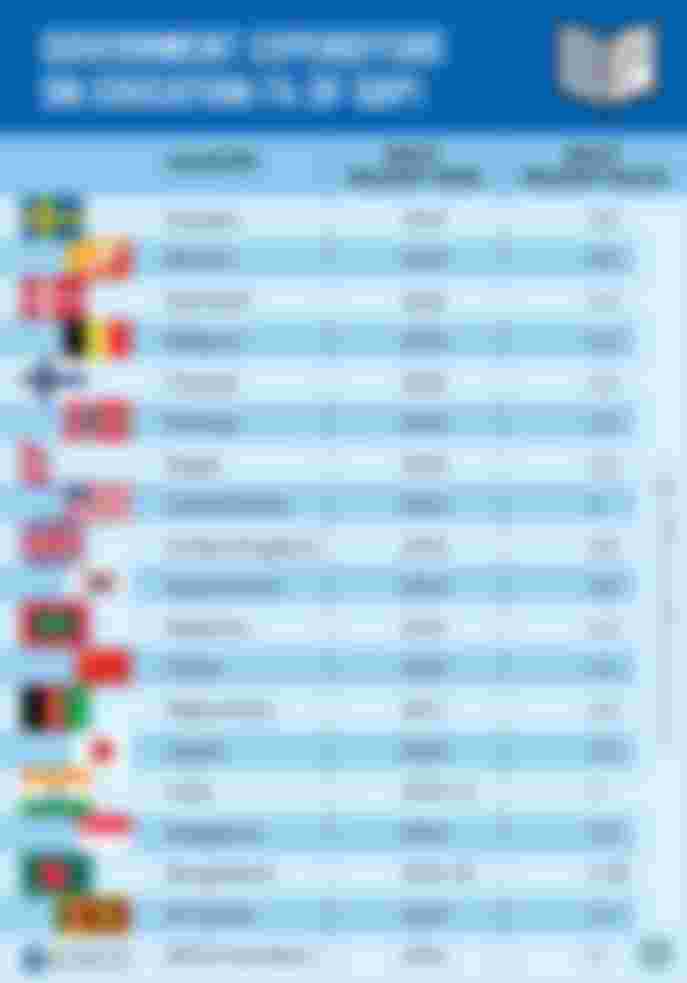Singapore and South Korea have their stories of economic development to tell. They have focused relentlessly on education as a way of developing their economies and raising the living standards of their people.
The message is loud and clear. The more you ensure teachers' status the more your children perform better in school resulting in accelerating economic growth. China, Singapore, South Korea and some other countries are glaring examples of this.
The situation in Bangladesh is unfortunately opposite. The outcomes are appalling: low quality of education is producing low- and semi-skilled workforce, causing enormous impact on our economy.
Take the example of China.
The world's second largest economy, China has raced past all others last year in the world's biggest education test organised by the Organisation of Economic Cooperation and Development (OECD).
High school students in Chinese mainland ranked first globally in reading, mathematics and science, according to a 2018 international benchmarking study by the OECD released December last year.

The Program for International Student Assessment (PISA) is done every three years to measure how well 15-year-olds worldwide make use of their knowledge to solve problems. The study is based on evaluation of nearly 6 lakh students from 79 countries and regions.
Chinese students participated in the last global competition, and their country topped the global ranking on the Global Teachers' Status Index – meaning teachers are evaluated most in China.
Chinese investment in education, research and development has helped the country emerge as a tech giant to challenge the global superpower, the USA.
Singapore and South Korea have their stories of economic development to tell. They have focused relentlessly on education as a way of developing their economies and raising the living standards of their people.
Singapore, the small Asian state, trounced the rest of the world in the 2015 competition. It ranked second in the last competition when China beat it.
South Korea ranked seventh in the last competition. It was sixth in the 2009 edition of the ranking and seventh in the 2012 test.
Regarding evaluation of teachers, Singapore and South Korea are among the top 10 countries on the Global Teachers' Status Index that studies status of teachers in different countries considering their pay, working hours and social recognition.
This index gives an academic proof of the link between the status of teachers in society and the performance of children in school.
Education is considered as the most effective weapon to spur economic growth as a study conducted by the OECD in 2015 says all countries, regardless of their national wealth, stand to gain from more and better education.
According to the OECD report, providing every child with access to education and the skills needed to participate fully in society would boost the GDP by an average 28% per year in lower-income countries and 16% per year in high-income countries for the next 80 years.
South Korea has set another example banking on education. It is the only nation in the world that moved from the list of the least developed countries to the OECD, an organisation of developed economies.
In view of former UN secretary-general Ban Ki-moon, "There is one word that explains how: education."
"When I was a child in war-time Korea, we were constantly told to study hard. That was the only way to invest in our future – and it worked. Studies show that $1 invested in education can generate up to $15 in economic gain. If all students in low-income countries learned basic reading skills, more than 170 million people could be lifted out of poverty," said Ban Ki-moon.
Our story is different. Bangladesh has achieved success in enrolling all children in primary schools. But it could not ensure quality of education due to a lack of proper infrastructure, adequate number of trained teachers.
Low spending remains the root cause of all the problems.
The consequences of low quality primary education are disastrous. A large number of students cannot make a smooth transition to SSC and HSC levels, which in turn prevent many of them from making their way into institutions of higher learning. The country needs at least a nominally educated workforce to produce food, work in factories and ports and so on.
Inadequate education at the secondary and tertiary levels, including technical and vocational education and training, is leaving students unequipped to meet the changing demands of the job market. As a result, they are struggling with a mismatch between the skills that employers seek and those that workers have.
Bangladeshi migrant workers also get less pay due to their low skills. In contrast, we are hiring foreign workers costing billions of dollars every year.
Take the RMG sector that accounts for 84% of our export earnings. The four-decade-old sector is still suffering from acute shortage of skilled manpower – from the floor to the executive level. The shortage compels factory owners to engage foreign employees in various positions.
Pays and status
According to the 2013 Global Teacher Status Index, over 20 countries have higher teacher salaries than the US relative to other college-educated workers. These include South Korea, Spain, Canada, Portugal, Turkey, Denmark, Greece, Australia and England.
In The Guardian, Peter Dolton, the author of the study, outlined his rankings of 21 different countries based on a survey of 21,000 citizens who were all asked the same questions.
According to Dolton, "To gauge the social standing of teachers we asked people to rank teachers against other professions such as doctors, lawyers and librarians…Would you encourage your own child to become a teacher? We also asked how much, in a fair world, teacher should be paid."
Teachers have the highest status in China, Greece, Turkey and South Korea, and the lowest in Italy, Czech Republic, Brazil and Israel. It is worth noting that in both cases, several of the countries were also on the list of highest and lowest-paying countries, accordingly, Dolton writes.
Interestingly, most countries surveyed compared teachers to nurses and social workers. The United States compared them to librarians. China, the country where teachers have the highest status, compared them to doctors.
In Bangladesh, teaching has not evolved as a prestigious profession. Primary school teachers, who have the status of Class III government employees, are struggling for their longstanding demand of upgrading their status and increasing their salaries.
Therefore, meritorious students do not prefer to join teaching.
The problems have long been diagnosed. Everyone speaks about the problems. But, the reality remains gloomy. Economists think low quality of education remains as a major hurdle for the country to become an upper middle income country by 2031.
In addition, the pandemic has put bigger challenges for teachers. Many of them have lost jobs, faced pay cuts. Students have remained confined to homes for months. None but teachers need to work hard to recover the education sector from this pandemic shock.
Against all odds, however, let's congratulate our teachers on the World Teachers Day.
